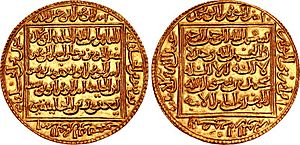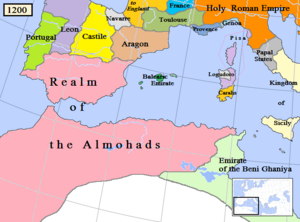Abdallah al-Adil facts for kids
Quick facts for kids al-Adil |
|||||
|---|---|---|---|---|---|
| Almohad Caliph | |||||

Gold dinar of Abdallah al-Adil
|
|||||
| Ruler of the Almohad Caliphate | |||||
| Reign | September 1224 – October 4, 1227 | ||||
| Predecessor | Abdul-Wahid I | ||||
| Successor | Yahya | ||||
| Born | unknown date | ||||
| Died | October 4, 1227 | ||||
|
|||||
| Dynasty | Almohad | ||||
| Father | Yaqub al-Mansur | ||||
| Religion | Islam | ||||
Abu Muhammad Abdallah al-Adil (died October 4, 1227) was an Almohad Caliph. He was a governor in al-Andalus (parts of Spain and Portugal ruled by Muslims). Al-Adil took power by force, replacing the previous ruler, Abd al-Wahid I. His actions in 1224 started a time of great trouble for the Almohad Empire. This period of instability lasted even after his death in 1227. Many historians see him as one of the least successful Almohad caliphs. His rise to power divided the Almohads. This division led to the loss of al-Andalus and the eventual fall of the Almohad state.
Contents
Early Life and Rise to Power
Abu Muhammad Abdallah was a son of the famous Almohad conqueror Yaqub al-Mansur. He was also the brother of Caliph Muhammad al-Nasir. Like his brothers, Abdallah served as an Almohad governor in al-Andalus.
In January 1224, the young Caliph Yusuf II al-Mustansir died suddenly. He was Abdallah's nephew and had no children to take over. Officials in Marrakesh, led by the vizier (a high-ranking minister) Abu Sa'id Uthman ibn Jami'i, quickly chose an elderly grand-uncle, Abd al-Wahid I, as the new caliph. They presented this as a done deal to the rest of the Almohad family.
Abdallah, who was governing in Murcia, and his brothers were unhappy. They felt the election was too rushed and perhaps against the rules. Abd al-Wahid I was also known for wanting to centralize power. This meant he was less likely to give the brothers the freedom they had enjoyed under the young Yusuf II.
Challenging the Throne
The Almohad dynasty had never had a disputed succession before. Even with disagreements, they usually supported the chosen caliph. So, a rebellion was a very serious matter. However, Abdallah was soon visited by Abu Zayd ibn Yujjan. This man was a former high official who had been exiled.
Ibn Yujjan convinced Abdallah to challenge the election. He promised Abdallah support from powerful people in Marrakesh. After talking with his brothers, Abdallah declared himself the new Almohad caliph. He took the title "al-Adil," meaning "the Just." He quickly took control of Seville and prepared to march on Marrakesh.
Meanwhile, Ibn Yujjan worked to gain support in Morocco. Soon, important tribal leaders declared their support for al-Adil. They took over the Marrakesh palace, removed the caliph Abd al-Wahid I, and exiled his officials.
The Consequences of the Coup
Abdallah al-Adil's forceful takeover shocked many Almohads. It broke the tradition of how rulers were chosen. However, Abdallah and his brothers were powerful in al-Andalus. They easily took control of the province. They replaced anyone who refused to accept their new rule.
Most people in al-Andalus accepted al-Adil. But three of Abdallah's cousins, who were governors, refused. They were Abu Zayd (in Valencia), Abd Allah (in Jaén), and Abu Dabbus. They were quickly removed from their positions. Abd Allah, the governor of Jaén, gathered a small group of followers. He set up camp in the hills and openly rebelled against al-Adil.
In Morocco, Abdallah al-Adil's takeover was not fully accepted. Many tribal leaders refused to support him. They rallied around his nephew, Yahya, the son of al-Nasir. To secure his rule, al-Adil made a big decision. He began moving most of the Almohad soldiers from Spain to Morocco. He planned to march on Marrakesh and force the leaders to accept him.
Loss of Al-Andalus
Al-Adil wanted to leave for Morocco quickly. So, he made only a weak attempt to remove al-Bayyasi from the hills of Baeza. This campaign was a failure. Al-Bayyasi's small group managed to fight off al-Adil's much larger armies.
Al-Adil quickly gained a reputation for being a poor military leader. News of his incompetence spread to Morocco. This made his opponents bolder and shook the confidence of his allies. Determined to take Marrakesh, al-Adil decided to ignore al-Bayyasi. He sped up the movement of troops to Morocco.
Meanwhile, al-Bayyasi made an alliance with Ferdinand III of Castile. Ferdinand was surprised but happy that Almohad troops were leaving. He saw an opportunity and sent a large Castilian army to help al-Bayyasi.
In 1225, al-Bayyasi and the Castilian army came down from the hills. Al-Andalus had very few Almohad soldiers left. They attacked the lands around Jaén and vega de Granada. By the end of the summer, al-Bayyasi had captured the city of Córdoba. Seeing this weakness, Alfonso IX of Leon and Sancho II of Portugal also launched their own attacks. Portuguese raiders reached the outskirts of Seville in late 1225.
The Seville Massacre and Al-Adil's End
Caliph al-Adil, his minister Abu Zayd ibn Yajjan, and other Almohad commanders were in Seville. But they did not have enough soldiers to fight the Christian army. So, the Portuguese raiders freely attacked the areas outside the city.
The people of Seville were disgusted by their rulers' inaction. They decided to fight back themselves. A large group of ordinary citizens formed an army and marched out to meet the Portuguese. It was a terrible defeat. The well-armed Portuguese soldiers easily defeated the poorly armed townsfolk. Thousands of people were killed near the walls of Seville.
People blamed Caliph al-Adil for the Seville massacre and other disasters. They saw him as incompetent and cowardly. However, al-Adil's luck soon changed. Al-Bayyasi had promised three border forts to Ferdinand III for his help. But one of the forts, Capilla, refused to be handed over. The Castilians had to lay a long and difficult siege.
The brave defense of Capilla, and al-Bayyasi's act of sending supplies to the Castilian attackers, turned public opinion against al-Bayyasi. People started to support the Almohad Caliph again. An uprising followed in Cordoba. Al-Bayyasi was killed, and his head was sent to the Caliph in Marrakesh.
But Abdallah al-Adil did not enjoy this victory for long. On October 4, 1227, he died in the palace. His nephew and rival, Yahya 'al-Mutasim', was then chosen as the new Almohad Caliph.
See also
 In Spanish: Abu Muhámmad al-Ádil para niños
In Spanish: Abu Muhámmad al-Ádil para niños
 | George Robert Carruthers |
 | Patricia Bath |
 | Jan Ernst Matzeliger |
 | Alexander Miles |


